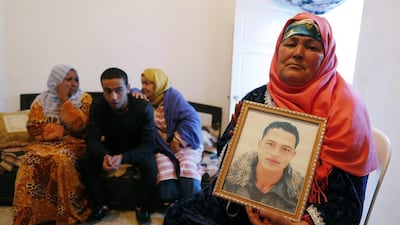OUESLATIA, TUNISIA // In shock after their son and brother was named the prime suspect in the Berlin market attack, Anis Amri’s family says he fled Tunisia seeking a better life, only to find more trouble and misery.
“If my brother is behind the attack, I say to him ‘You dishonour us’,” said Abdelkader Amri on Thursday.
He spoke as his brother was on the run after Monday’s attack on a Christmas market, in which a large lorry ploughed through a crowd, killing 11 people.
A 12th victim, the hijacked vehicle’s Polish driver, was found shot dead in the cab.
Prosecutors in Germany have issued a Europe-wide wanted notice for 24-year-old Amri, offering a €100,000 (Dh384,009) reward for information leading to his arrest and warning he “could be violent and armed”.
On Thursday, German Chancellor Angela Merkel said she was proud of the calm public response to the ISIL-claimed attack.
“In the past few days I have been very proud of how calmly most people reacted to the situation,” she said.
“I am certain we will meet this test we are facing.”.
Interior minister Thomas de Maiziere said evidence indicated “a high probability that the suspect is the perpetrator”, adding that Amri’s “fingerprints were found in the truck cabin”.
Mrs Merkel said Germany had “known for a long time that we are in the crosshairs of Islamic terrorism. And yet, when it happens ... it is a totally different situation.”
She praised the “highly professional work” of federal and state police as well as the “smooth cooperation” with international partner organisations.
Her comments came despite harsh criticism for security and migration agencies after it emerged that Amri was a rejected asylum seeker and known extremist who had previously been suspected of plotting an attack. He was under police observation for months before surveillance was dropped.
A security official in Oueslatia, Amri’s hometown in central Tunisia, said ISIL had recruited Amri in Italy.
But his brothers Walid and Abdelkader were struggling to come to terms with the idea that his brother could have carried out the attack.
“We denounce the accusations against my brother,” Walid said. “We know him well. He has done nothing!”
Outside their home in Oueslatia, some 50 kilometres from the city of Kairouan, Abdelkader spoke of his brother’s departure from Tunisia more than five years ago.
The youngest of nine siblings, with divorced parents and in difficult social circumstances, Amri left the country illegally in March 2011 by sea for the Italian island of Lampedusa.
He was fleeing a court conviction and a sentence of four years handed down in absentia for robbery and burglary, Abdelkader said.
A security official in the area confirmed this information.
“Anis left to get away from misery – he had no future in Tunisia and wanted at all costs to improve the family’s financial situation. We live below the poverty line, like most families in Oueslatia,” Abdelkader said, his eyes red.
His brother Walid added: “He lived like all young people – he drank, he didn’t go to prayers or anything.”
Once in Italy, Anis Amri found himself in a detention centre along with other illegal migrants.
But he soon got himself into trouble: he was sentenced to four years in jail for setting fire to a building, Abdelkader said.
“In 2015 he had made it to Germany and was trying to sort himself out. He worked as an agricultural labourer and things like that,” he said.
“He’d contact us on Facebook, saying he wanted to come back to Tunisia but that he had to earn some money to buy his own car and start his own business.”
According to Walid, “10 days before the attack he told us he was counting on God to get him home in January”.
Abdelkader said their brother “was laughing and joking with us. There was no sign he had been radicalised. I’m sure he can’t have done this, that’s not why he emigrated. May God reveal the truth,” he said before bursting into tears, remembering that Thursday was Amri’s birthday.
“I want to wish him happy birthday.”
But at least one Tunisian newspaper already seemed to have determined Amri guilty.
"These cursed sons who damage the country," read a headline in the French-language La Presse on Thursday.
“There’s no point in trying to hide the fact: every time a terrorist attack takes place in the world, the people of Tunisia hold their breath.”
“Because many times a cursed son has been responsible for carrying out a major attack.”
* Agence France-Presse

